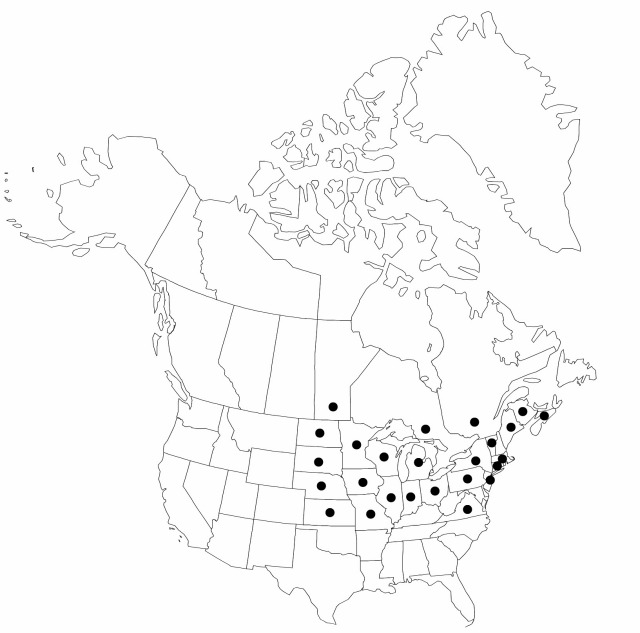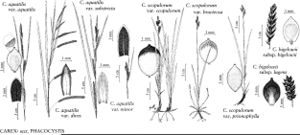Difference between revisions of "Carex aquatilis var. substricta"
in H. G. A. Engler, Pflanzenr. 38[IV,20]: 309. 1909.
FNA>Volume Importer |
FNA>Volume Importer |
||
| Line 12: | Line 12: | ||
|name=Carex substricta | |name=Carex substricta | ||
|authority=(Kükenthal) Mackenzie | |authority=(Kükenthal) Mackenzie | ||
| + | |rank=species | ||
}} | }} | ||
|hierarchy=Cyperaceae;Carex;Carex sect. Phacocystis;Carex aquatilis;Carex aquatilis var. substricta | |hierarchy=Cyperaceae;Carex;Carex sect. Phacocystis;Carex aquatilis;Carex aquatilis var. substricta | ||
| Line 27: | Line 28: | ||
|elevation=0–1000 m | |elevation=0–1000 m | ||
|distribution=Man.;N.B.;N.S.;Ont.;Que.;Conn.;Ill.;Ind.;Iowa;Kans.;Maine;Mass.;Mich.;Minn.;Mo.;Nebr.;N.J.;N.Y.;N.Dak.;Ohio;Pa.;S.Dak.;Vt.;Va.;Wis. | |distribution=Man.;N.B.;N.S.;Ont.;Que.;Conn.;Ill.;Ind.;Iowa;Kans.;Maine;Mass.;Mich.;Minn.;Mo.;Nebr.;N.J.;N.Y.;N.Dak.;Ohio;Pa.;S.Dak.;Vt.;Va.;Wis. | ||
| − | |discussion=<p>Populations of <i>Carex aquatilis </i>var.<i> substricta</i> from Minnesota to Massachusetts tend to have very pale scales with a very broad, pale brown midvein, distinctly obovoid perigynia, and broad pistillate spikes that are rarely staminate at the apex. These populations tend to occur on neutral or calcareous substrates (fens) rather than the more acidic marshes favored by < | + | |discussion=<p>Populations of <i>Carex aquatilis </i>var.<i> substricta</i> from Minnesota to Massachusetts tend to have very pale scales with a very broad, pale brown midvein, distinctly obovoid perigynia, and broad pistillate spikes that are rarely staminate at the apex. These populations tend to occur on neutral or calcareous substrates (fens) rather than the more acidic marshes favored by <i></i>var.<i> aquatilis</i>. The two varieties intergrade where they come into contact.</p> |
|tables= | |tables= | ||
|references= | |references= | ||
| Line 36: | Line 37: | ||
-->{{#Taxon: | -->{{#Taxon: | ||
name=Carex aquatilis var. substricta | name=Carex aquatilis var. substricta | ||
| − | |||
|authority=Kükenthal in H. G. A. Engler | |authority=Kükenthal in H. G. A. Engler | ||
|rank=variety | |rank=variety | ||
| Line 51: | Line 51: | ||
|publication year=1909 | |publication year=1909 | ||
|special status= | |special status= | ||
| − | |source xml=https://jpend@bitbucket.org/aafc-mbb/fna-data-curation.git/src/ | + | |source xml=https://jpend@bitbucket.org/aafc-mbb/fna-data-curation.git/src/f50eec43f223ca0e34566be0b046453a0960e173/coarse_grained_fna_xml/V23/V23_712.xml |
|genus=Carex | |genus=Carex | ||
|section=Carex sect. Phacocystis | |section=Carex sect. Phacocystis | ||
Revision as of 20:10, 16 December 2019
Culms 35–100 cm, angles glabrous or scabrous. Leaves: basal sheaths leafless, usually red-brown; blades amphistomic, 5–8 mm wide, papillose on both surfaces. Inflorescences: peduncle of proximal spike not more than 4 cm; proximal bract longer than inflorescence, 4–8 mm wide. Spikes erect; proximal 2–6 spikes pistillate, 4–6 cm × 4–7 mm, base cuneate or attenuate; terminal 1–3 spikes staminate. Pistillate scales pale red-brown with narrow red-brown marginand broad pale midvein. Perigynia pale brown, veinless, obovoid, 2.6–3.2 × 1.5–2.2 mm, apex rounded; beak pale brown, thickened, not more than 0.2 mm. 2n = 76, 77.
Phenology: Fruiting Jul–Aug.
Habitat: Marshes, shallow water along shores, usually in neutral or calcareous substrates
Elevation: 0–1000 m
Distribution

Man., N.B., N.S., Ont., Que., Conn., Ill., Ind., Iowa, Kans., Maine, Mass., Mich., Minn., Mo., Nebr., N.J., N.Y., N.Dak., Ohio, Pa., S.Dak., Vt., Va., Wis.
Discussion
Populations of Carex aquatilis var. substricta from Minnesota to Massachusetts tend to have very pale scales with a very broad, pale brown midvein, distinctly obovoid perigynia, and broad pistillate spikes that are rarely staminate at the apex. These populations tend to occur on neutral or calcareous substrates (fens) rather than the more acidic marshes favored by var. aquatilis. The two varieties intergrade where they come into contact.
Selected References
None.
